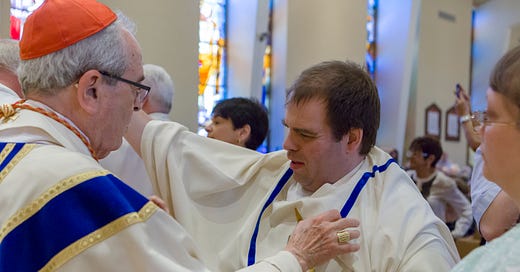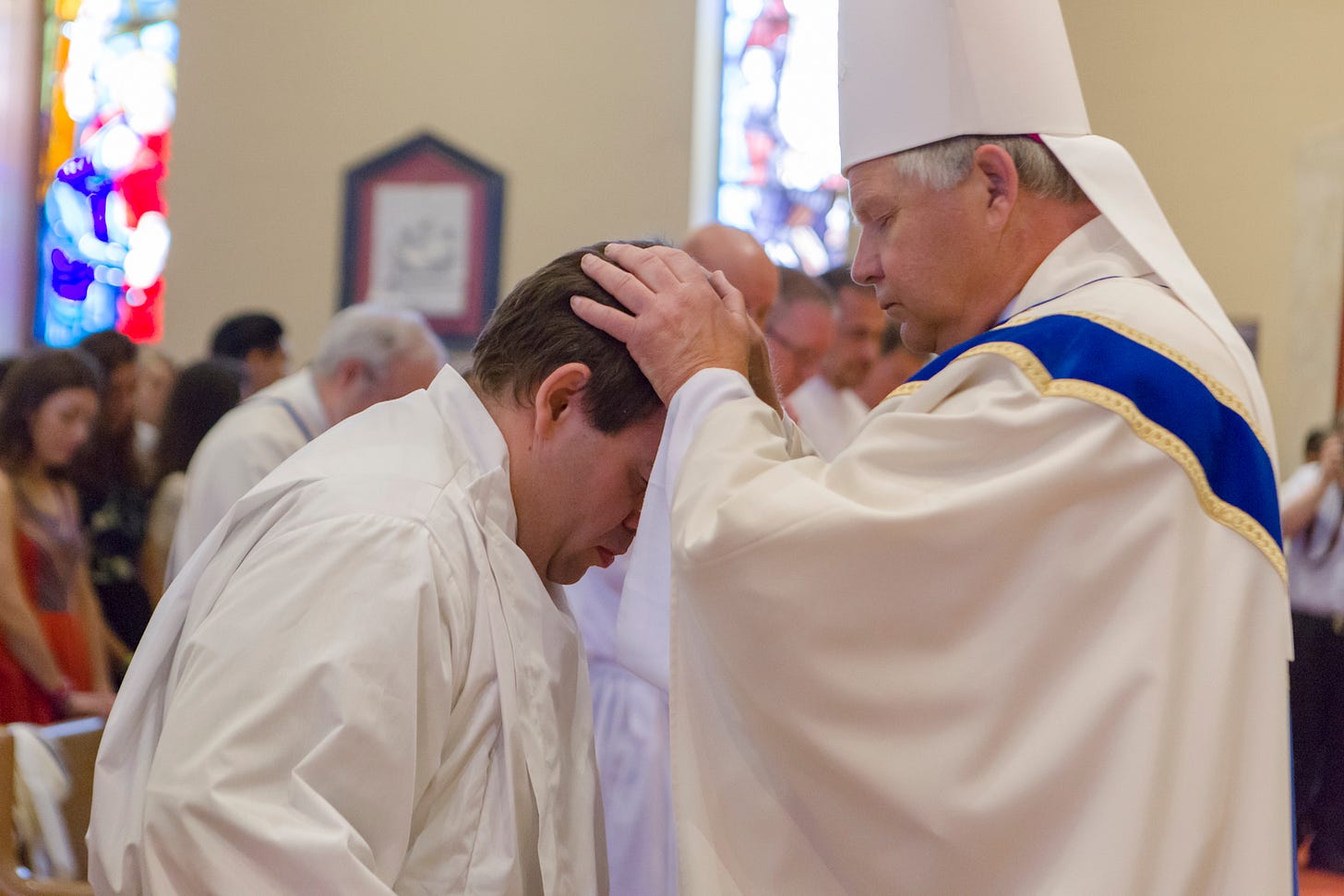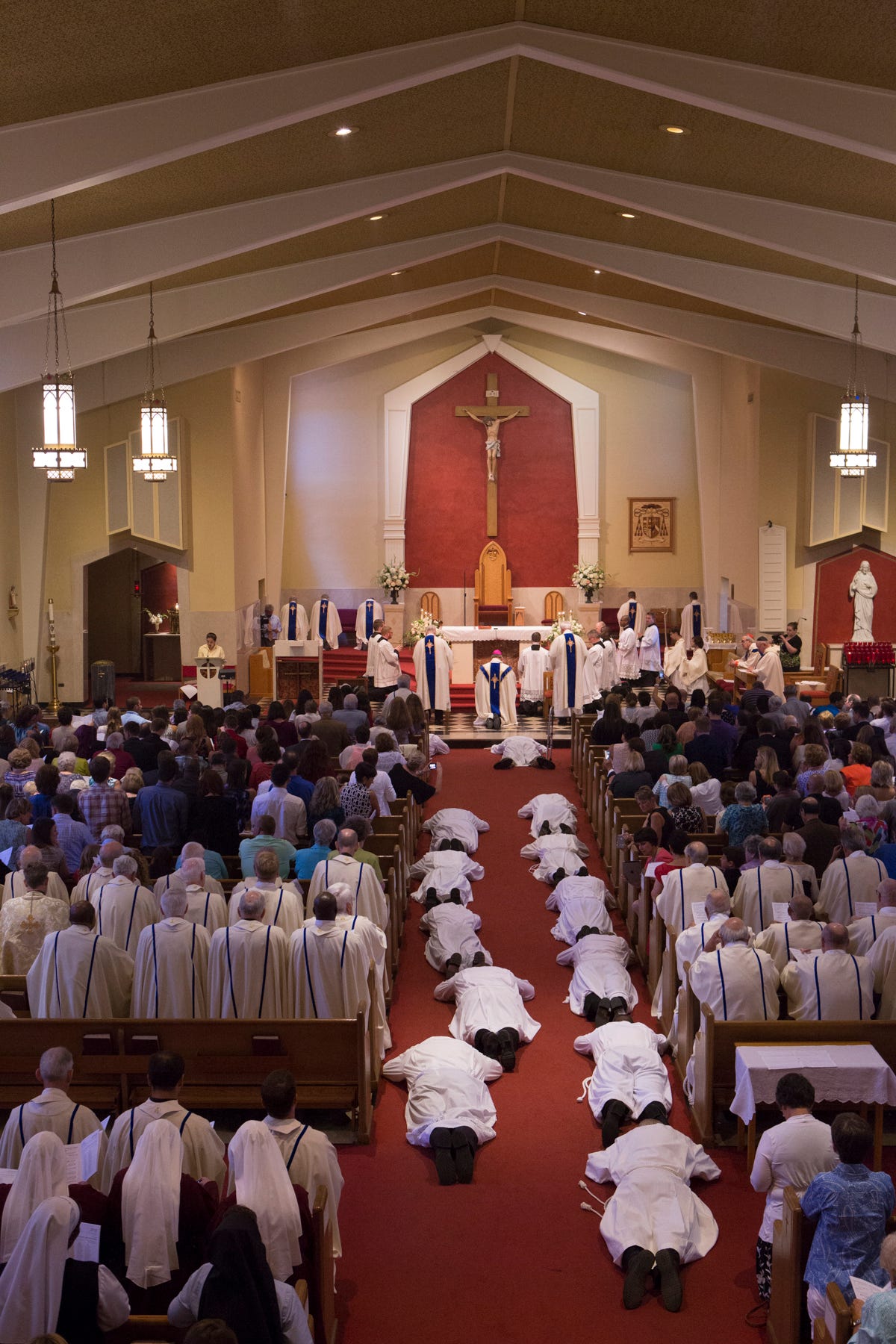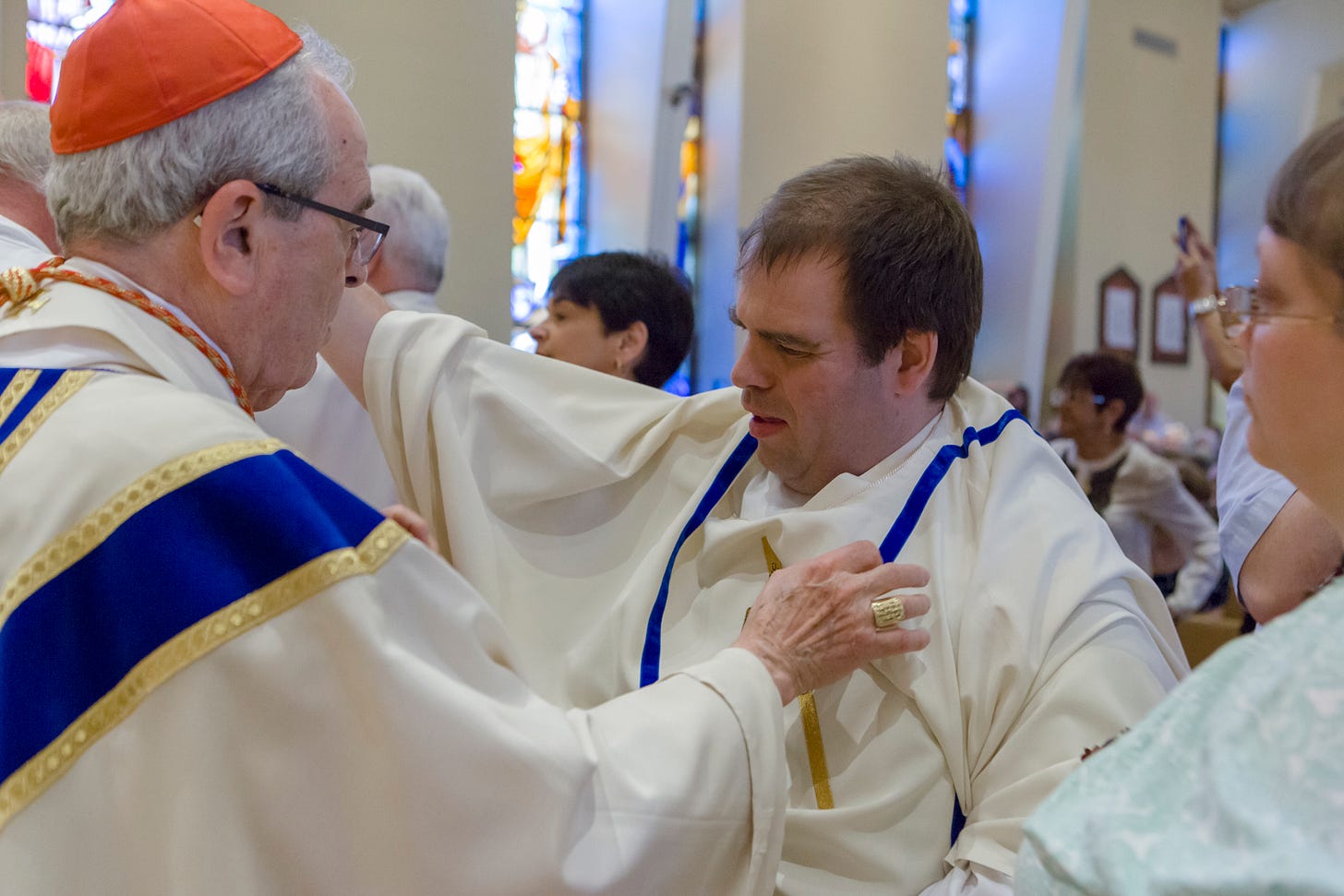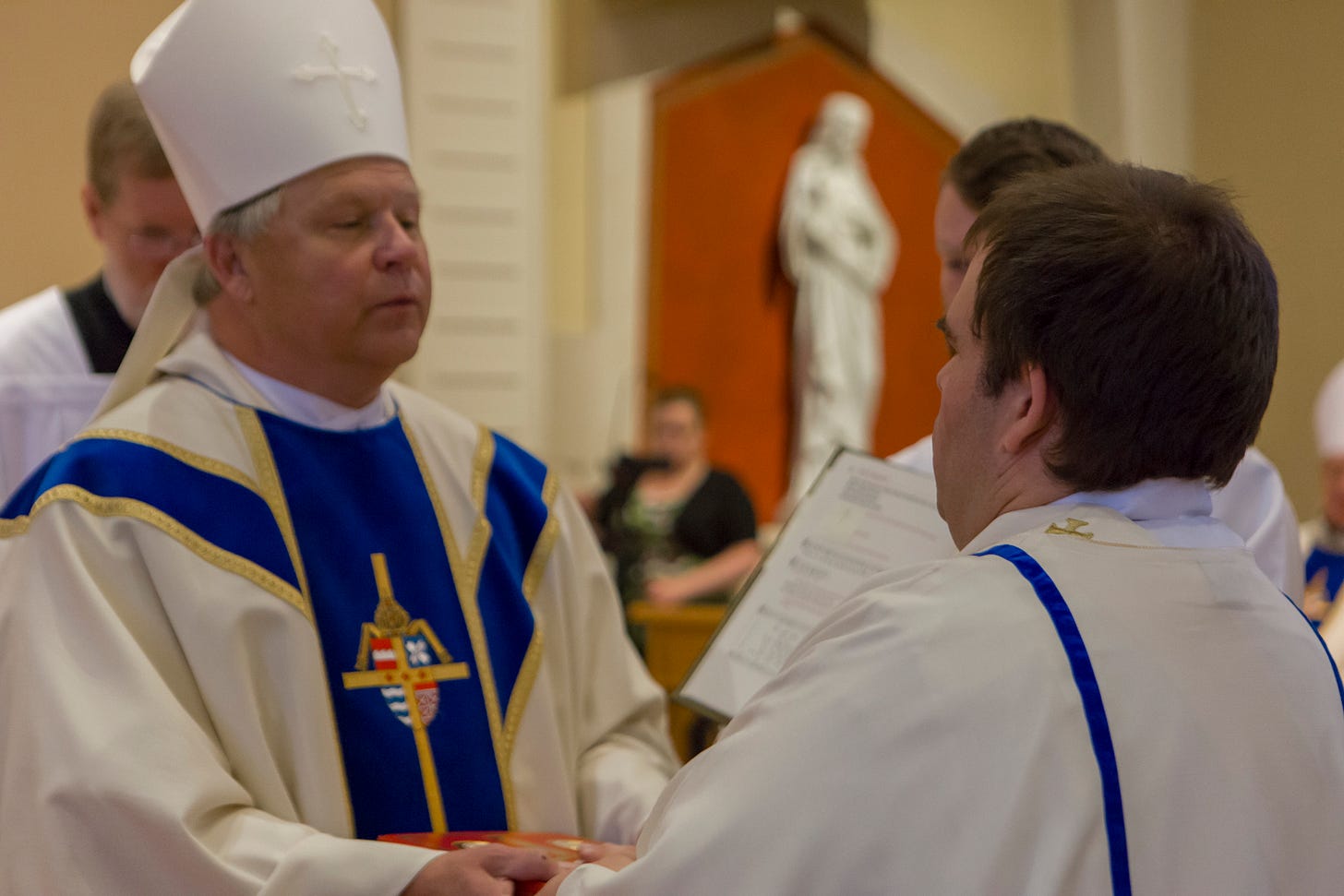A Reflection on Eight Years of Ordained Ecclesiastical Life
The continued discussion in some Catholic circles about the possibility of ordaining women as deacons seems to miss the point of what ordination really is, let alone the blatant Biblical restriction.
There are a great many thoughts that can come to mind on the occasion of the anniversary of my ordination to the diaconate. Recently I have especially been meditating on the whole concept of service and what it means, and I have come to the conclusion that many people, including not a few deacons from time to time, have failed to completely understand or comprehend the concept of Christian service, especially as it relates to ordained ministry, diaconal ministry.
In recent weeks there has been a most predictable online discussion in Catholic circles, and somewhat in secular circles after Pope Francis gave an interview to CBS and the question was asked whether or not a young Catholic girl today could ever be able to be ordained a deacon. “No,” the Holy Father very plainly and directly said. The Pope then went on to explain that women could serve the Church in a role of important diaconal service without being ordained.
The continual asking of this question, not just by the secular media but within Catholic circles, betrays a fundamental misunderstanding of both Christian service and the nature of ordination. One does not need the Sacrament of Holy Orders in order to be of service to the Kingdom of God, and that is true whether a person is male or female. Holy Orders is not about what you do, it is about who you are in what we might call the Sacramental economy of the Kingdom of God. To be ordained is a designation placed on the soul for eternity, what the Church calls ontological change. That permanent change to the soul is effective whether you are assisting or serving at the altar, teaching a sacramental preparation class, acting as chaplain for a parish group, or simply sitting in the pew with your family. That ontological change is permanent and effective whether or not the man who is ordained ever publicly exercises Ministry or not, hence the man who has been ordained must be prepared to stand before God and be held to account for that reality.
The Greek word for deacon, diakonia, literally translates as “servant,” or more accurately as “slave.” When I was ordained eight years ago, I agreed to be ontologically conformed to Jesus Christ the Servant, to be a slave for the sake of my fellow believers. Yet for the advocates of women's ordination, Holy Orders in general, and the order of deacon in particular, seems very often to be seen as some sort of expression of clerical privilege. Indeed, I have had those who favor women's ordination tell me that very thing, that “clerical privilege should not be reserved only for men!” My typical response is to ask what privilege is it they are thinking of?
Perhaps it is the privilege of being the last one out of the church on Sunday afternoon when you have dinner planned with your family, because one of God's people have a question or request for you, and you're there to serve them and need to give them priority. Failing to do so is not living up to your vocation. Perhaps the clerical privilege that should not be reserved is the privilege of feet that are throbbing from having been on them all weekend with more to come. Perhaps the clerical privilege that shouldn't be reserved is getting to dress up in beautiful vestments on Sunday, in nearly 90° East Tennessee summer heat with the sweat dripping off of you, something that has happened so many times that you rarely ever wear clerical shirts on Sunday anymore, because you'll ruin them. Maybe what the proponents of women's ordination mean by clerical privilege is the privilege of being isolated from the community of your fellow clergy. Not that this is done on purpose, mind you, but because of issues of time and space and need. Just as priests also need pastors, deacons need their brothers, clergy need fraternity, yet it happens with such infrequency. How about the privilege of trying to sing the Exultet with a broken rib? On top of all of these privileges, you have the privilege of going home to your family, who you must serve not with equal vigor, but with far greater attention. Yes, these privileges are reserved for the men chosen for the diaconate. I wouldn't trade them for anything, but for some reason they don't seem to me to be indicative of a life of ecclesiastical privilege.
In reality, when the proponents of women's ordination persist in their erroneous notions-and we can call them that-Mother Church should perhaps be more direct, because Sacred Scripture is actually very direct on this question and that is exactly why the Church has always taught as she does that women cannot receive Sacred Ordination. The Word of God tells us, through the pen of St Paul the Apostle who was acting on apostolic authority (1 Timothy 2:8-15):
I desire then that in every place the men should pray, lifting holy hands without anger or quarreling; also that women should adorn themselves modestly and sensibly in seemly apparel, not with braided hair or gold or pearls or costly attire but by good deeds, as befits women who profess religion. Let a woman learn in silence with all submissiveness. I permit no woman to teach or to have authority over men; she is to keep silent. For Adam was formed first, then Eve; and Adam was not deceived, but the woman was deceived and became a transgressor. Yet woman will be saved through bearing children, if she continues in faith and love and holiness, with modesty.
The reality is that this is the Scriptural source of the Church's teaching against the ordination of women. While other ecclesial communities may believe that we can play selective morality with the Word of God, it has consistently been the Catholic Church through the ages which has asserted that we may not do that. On the questions of morality and familial social order, everything from divorce to the nature of Church governance, the Catholic Church's moral teachings have remained consistent, even if the actions of her leaders have unfortunately not. Almighty God, it turns out, doesn't particularly care about our modern sensibilities. His Truth is the same yesterday, today, and forever.
In today's culture and society these words cannot be easy to read or hear. We have become quite used to a culture of egalitarianism, and indeed some ecclesial communities simply ignore this and other passages which clearly point to a patriarchal nature of the Church.1 However, the two things which must be remembered are that when Sacred Scripture and the Church's traditional teaching point to this passage and its sister passages, God's Word is speaking to us primarily of the spiritual order, and it is spiritual leadership especially wherein men are called to exercise headship.2 We cannot impose a Christian concept of spiritual leadership on a secular and increasingly pagan world, the world can only accept Christianity freely. Secondly, female submission to the headship of men in Scripture and Sacred Tradition applies primarily to spiritual matters. No woman is obliged by God's Word to tolerate an abusive or neglectful spouse or male relationship, and men who abuse the spiritual authority God gives them will most certainly be brought to account before God if the civil authorities do not hold them accountable first!
Conversely, some good men mistake the patriarchal nature of spiritual leadership in the Church to mean that diaconal ordination puts a man in some special status. Recently I had a conversation with a brother deacon (not one from my own diocese) who expressed very legitimate concerns that some brother clergy, especially priests, do not treat deacons who are terminally ordained to that status with the respect that they deserve as clergy. This brother further expressed the concern that many of our brother deacons are relatively ill formed for the tasks of teaching and preaching which they are given from the Church by virtue of their ordination. Although I share many of these concerns, I strongly believe that because deacons are ordained and conformed to Christ the Servant, our primary concern should not be how we are treated by the institutional Church, by brother clergy, or even by our fellow parishioners, but instead we should be concerned with whether we are allowing the Lord to humble us through our service to our brothers and sisters, and whether that humility is adequately reflected in our preaching, teaching, and conduct. I will be the first to admit that eight years on I have a lot of work to do in order to be as humble as Jesus.
I am grateful that I was chosen to be a part of the Church's ordained Ministry, and I thank the Lord for that reality every day. Most of all, I pray each day that the Lord would give me the graces not only to be holy in my vocation, but to be Christ the servant to others, and to help me find ways to do just that, to be in the midst of the people of God as one who serves.
-
Special thanks to Stephanie Richer/Stephanie Richer Photography for the outstanding photos of the ordination of our diaconate class.
Ex: See 1 Corinthians 14:33-35
In the Church today in many homes, men often cede their God-given responsibility to be the spiritual leader of the home (cf. Ephesians 5:21-33) to either their wives or the grandparents of their children, who are often the ones to see to the children's spiritual education and development. Credit must be given to the holy mothers and grandparents who are doing the best with what they have been given. While there are many factors in the decline of the Church in the west and particularly the decline in Mass attendance in developed countries that we could go into in great detail, it has to be said that this feminization of the Church is playing a role. Fathers are extremely important in the spiritual development of the family. Families without active fathers, especially fathers who are not spiritually active, are far less likely to see spiritually active children.

